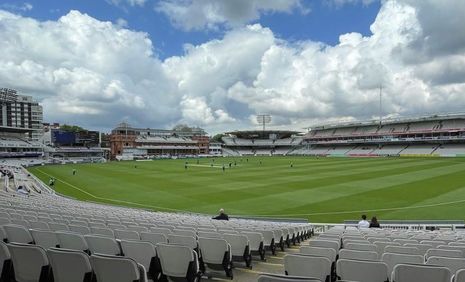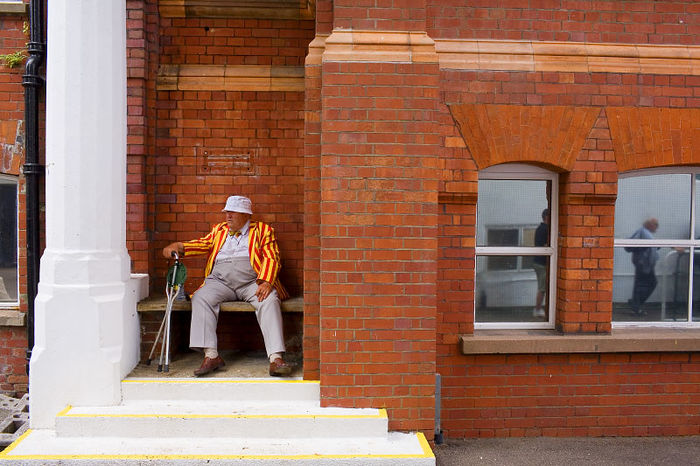Is it time for Cambridge and Oxford to leave Lord’s?
As rugby’s Varsity Match moves away from Twickenham after more than one hundred years, Will McLaughlin and Alex Davies debate whether it’s time for Oxbridge to finally move out of The Home of Cricket

Will: Oxford and Cambridge should not be playing at Lord’s
Oxford captain Christopher Wordsworth had already played Cambridge captain Herbert Jenner in the Eton vs Harrow Lord’s match in 1822. “Bertie old boy,” Wordsworth probably said in 1827 “I awfully enjoyed that cricketing lark a few years ago, and I’ve been itching to dust off the old willow ever since. Why not bring your boys to Lord’s?” Jenner agreed, and with that now-two-hundred year old exchange, ‘The University Match’ was born. It has run annually ever since, and recently it has been confirmed that it will continue until 2027.
This year, an independent investigation by the Independent Commission for Equity in Cricket (ICEC) found that “an elitist and exclusionary culture exists at all levels of cricket.” While Cambridge and Oxford cricket squads are not elitist or exclusionary by design, the fact remains that they are heavily private-school dominated, and a symbol of the country’s elite. In the ECB’s strategy document, they pledge “to broaden cricket’s loyal base to make the game more representative of our modern and diverse society.” But by placing Cambridge and Oxford on the greatest cricket pitch in England every year, the MCC is painting a clear picture of who they think cricket is for.
“How about giving some kids a chance to play at Lord’s who go to state schools?” suggested former Lancashire seamer Kyle Hogg as an alternative. Using the Lord’s match as a final for a state secondary school competition would not only give the students the experience of a lifetime, but could also be a symbol for cricket’s future. It would show that cricket is not a sport which celebrates only those who don silly gowns and sip rosé in large decorated halls, but anyone who has the ability for it.
And with the rugby Varsity match moving away from Twickenham after 100 years of history, there is a precedent. Stephen Fry, president of the MCC is also asking for change. “I’m not being all woke and wet-blankety” he said after his proposal to scrap the Varsity cricket match. “It’s about opening it up to more schools.”
We have absolutely no claim to Lord’s. Tradition alone has kept us at the crease of the greatest cricketing arena in England almost up to our double-century. It’s an impressive innings, but with cricket’s aspiration to create an accepting, diverse game, we should have been out a long time ago. The annual Oxbridge Lord’s games are now a test for English cricket. Does the MCC continue to ally the game with its elitist, classist past? Or can they move with cricket’s evolving vision, showing children across England that cricket is for them too, and giving opportunities to players not because of where they go to school, but for skill and hard work?
Alex: Oxford and Cambridge should stay
English cricket has an image problem. Despite the work of the ECB in recent years to open up the game to a wider audience through schemes such as All Stars Cricket and The Hundred, it still has a long way to go. If you went into an average British state school and asked the students what they thought of cricket, you would be met with contempt from the majority; “boring, posh sport” would still be the general response.
Stephen Fry seems desperate to help the sport shed its own elitist skin by using Oxford and Cambridge as an unnecessary scapegoat. The universities are still viewed as elitist by much of the public, so by banishing them from Lord’s, Fry is attempting to push cricket’s image into the 21st century. However, in the last academic year the proportion of privately educated students at Cambridge has fallen to just 27%. At Oxford it was at 32%, but had fallen by 8% in the last four years. The state school proportions at Oxbridge are now higher than the likes of Exeter, Edinburgh, Durham, UCL and Imperial. Clearly it is a work in progress, but the universities of today are not the same public school extensions they were two centuries ago.
In the Cambridge men’s team that played at Lord’s last year, nine out of eleven were privately educated. It may seem that this contradicts my argument, but state school students had the same opportunity to try out for the team. The reason for their low representation is either because they weren’t interested in the sport or because they weren’t good enough. Why? Because the sport has as yet failed to properly expose itself to all levels of society. Fry has nobly proposed a state-school tournament with the final being held at Lord’s and although this is a progressive idea which would increase interest and opportunity within the sport, why must this come at the expense of the Oxbridge game?
To play at The Home of Cricket is a privilege difficult to match. Instead of a policy of exclusion, the MCC and ECB should be attempting to increase such opportunities if they truly want to increase diversity within the sport. Why do Oxbridge have to be pushed out to allow state schools in? The argument from Lord’s would be that the calendar does not permit an increase in the number of matches played there, but former England captain David Gower has pointed out that the number of scheduled days play is laughable: “years ago there were 92 days scheduled and now there is more amenable turf and the ground drains easily.” It simply doesn’t have to be one or the other.
Cricket needs to work harder to fix its own image instead of shifting the blame onto institutions whose progress currently outstrips it. Getting rid of the Varsity Match may give Fry the plaudits he obviously seeks, but it will do nothing to address the true problem the sport is faced with. Why should Oxbridge cricketers be punished because certain administrators want to put their short-term image over long-term progress?
 News / Hundreds of Cambridge academics demand vote on fate of vet course20 February 2026
News / Hundreds of Cambridge academics demand vote on fate of vet course20 February 2026 News / University Council rescinds University Centre membership20 February 2026
News / University Council rescinds University Centre membership20 February 2026 News / Judge Business School advisor resigns over Epstein and Andrew links18 February 2026
News / Judge Business School advisor resigns over Epstein and Andrew links18 February 2026 News / Petition demands University reverse decision on vegan menu20 February 2026
News / Petition demands University reverse decision on vegan menu20 February 2026 News / Caius students fail to pass Pride flag proposal20 February 2026
News / Caius students fail to pass Pride flag proposal20 February 2026










